

SCS Engineers’ newest environmental technology application is for use at solid waste facilities and landfills. These sites require specific monitoring and analyses of groundwater and liquids, landfill gas – LFG, and surface emissions critical to facility infrastructure and the environment.

SCS MobileTools® is the iOS and Android mobile interface for the SCSeTools® platform. Access to data to make informed decisions is especially valuable when technicians are in the field, or operators are working remotely. Landfill and solid waste facility owners, operators, and technicians use the new application to observe system and environmental activity securely and in real-time on a mobile phone or device.
Featuring state-of-the-art technology, SCS MobileTools® provides users the ability to interact with a site or facility data, including site-specific monitoring and exceedance metrics for landfill gas, liquid levels, and surface emissions. Responsive, touch-enabled flow data charting is accessible, illustrating flow targets, reading dates, flow rates, and historical flow data analysis.
When compared year-over-year, generation and disposal trends produce information critical to assessing optimal options and solutions that represent significant savings for landfill gas Operations, Maintenance & Monitoring – OM&M programs. For this reason, the savings compound for regional or national operators.
For instance, monitoring and analyzing landfill gas generation and collection data against modeled estimates are valuable information. SCS MobileTools® handles the input, analysis, review, and export of landfill gas flow and related information, specifically flow rates, impacts on gas collection (e.g., extraction well liquid levels), and analytical data for data collection points.
In SCS’s release pipeline, SCS MobileTools® will include mapping and visualization functions in early 2021. SCS MobileTools® is available for download on the Apple App Store for iPhones and iPads, Google Play for Android.
Utility Dive reports that Alliant Energy announced its commitment to net-zero carbon emissions from its electricity by 2050.
The “new aspirational goal” reduces carbon emissions by 50% below 2005 levels by 2030 and eliminates all coal-fired power by 2040, 10 years faster than previously planned. Alliant owns or partially owns eight coal-fired power plants across Wisconsin and Iowa — three of which are slated for retirement or conversion to natural gas.
Alliant’s announcement follows growing commitments by investor-owned utilities to move toward a more low-carbon fuel mix. Xcel Energy, Madison Gas, and Electric and Consumers Energy are among the other Midwest utilities to have made such a pledge.
Alliant reached its 30% renewables by 2030 goal this year and its “intention is [to] keep adding renewables to our energy mix,” utility spokesperson Scott Reigstad said in an email.
Alliant also said it may keep some natural gas-fired plants online, retrofitted with carbon capture or some other emissions-reducing technology, or it could also use carbon offsets to reach that goal.
Read the full article including solar and other renewables on Utility Dive’s website.
Environmental Business Journal had this to say in their recently published Emerging Technology & the Environmental Industry issue:
SCS Engineers has built an impressive history, set of accomplishments and qualifications in designing, building and operating Renewable Natural Gas (RNG) facilities. In the RNG field, which is one of the company’s most important market areas, SCS creates the RNG by removing almost all other gas constituents except the methane. These other constituents include carbon dioxide, hydrogen sulfide (H2S) and other sulfur compounds, and volatile organic compounds (VOCs) including siloxanes, oxygen, nitrogen, and waste.
According to Steve Hamilton, a senior vice president, SCS’s leadership position is a result of the firm’s holistic approach and experience.
Our teams employ decades of energy systems expertise as we analyze and evaluate the effects of variations in processes and the parameters important to success. SCS models, maps, and evaluates complex systems and processes to evaluate plant performance. We account for project objectives and requirements while taking your technical, business, energy and environmental objectives into account.
Read the article here, or visit the SCS Engineers website.
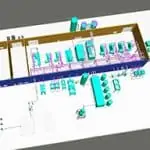
SCS is receiving the Gold Business Achievement Award for a Large Environmental Firm, for outstanding business performance in 2019. We largely attribute our organic growth to our clients interested in Sustainable Materials Management (SMM) and renewable natural gas (RNG) services. Our SMM programs increase our clients’ solid waste management efficiencies, reduce waste, and support sustainable recycling, and our design and design/build facilities convert landfill gas, dairy digester gas, and wastewater treatment plant digester gas to RNG. In addition, SCS’s Geographic & Practice Area Expansion initiative in 2019 enables us to expand our professional engineering and consulting services for liquids management, wastewater treatment, and emerging contaminants from new offices in the South, Central, and Midwest regions of the United States.
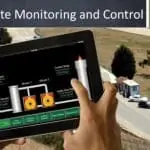
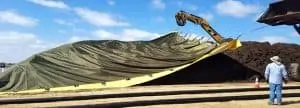
The Environmental Services Division of the city of San Diego, in collaboration with SCS Engineers, is receiving the Composting Project Merit Award in recognition for the composting operation at the Miramar Landfill in San Diego. In collaboration with the City, SCS designed an innovative covered Aerated Static Pile (ASP) composting system that will divert 100,000 tons per year of organic waste from the landfill. The ASP became operational in August 2019 and will compost 40,000 tons per year into useful by-products (and has capacity for an additional 20,000 tons). It provides an enhanced stormwater control system, and will eventually run on renewable energy generated from the landfill. According to the StopWaste.com calculator, the upgrade reduces greenhouse gas emissions by the equivalent of removing 19,015 cars from the road.
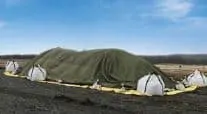
In addition, the recent announcement of SCS’s ASP Composting Pilot Program is making headlines. SCS owns a covered ASP compost system that is mobile and can be set-up on sites within an area of 50 feet by 100 feet, or less. In the covered ASP compost system, process and odor control is pro-active with a shorter composting period. Pilot tests allow waste managers to assess composting and to see if it is the right fit for their situation. The ASP system processes material batches in two months. Additional batches or “recipes” can test in 2-month intervals.
“Managing air, water, and soil pollution prevention are driving state and local regulations,” said Bob Gardner, a Senior Vice President of SCS Engineers. “Offsetting as much of the cost by improving operations, lowering energy consumption, and switching to renewable energy resources is critical to our clients.”
About SCS Engineers
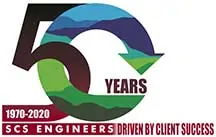 SCS, an employee-owned environmental consulting and construction firm, is celebrating our 50th year in business. We are producing technologies and programs that lower industrial operating costs and reduce greenhouse gases for private and public clients who are establishing goals to reduce their environmental impact.
SCS, an employee-owned environmental consulting and construction firm, is celebrating our 50th year in business. We are producing technologies and programs that lower industrial operating costs and reduce greenhouse gases for private and public clients who are establishing goals to reduce their environmental impact.
Our technologies and programs are finding footholds in the agricultural, industrial, and manufacturing sectors as municipalities and companies aim to reach climate change goals without passing all of the expense to consumers. SCS clients entrust us with the management of more than 35 million metric tons of anthropogenic CO2e greenhouse gases every year. We collect and beneficially use or destroy enough to offset greenhouse gas emissions from 7.4 million passenger cars annually.
Planning your RNG pipeline design requires a review of how the project might impact land use, archaeologic resources, endangered resources, floodplains, wetlands, and soil erosion. The linear nature of pipeline projects often requires permits from multiple agencies, transportation authorities, and railroads. Getting the agencies involved early and identifying review timeframes will help keep your project on track.
Betsy and Andy will present two case studies for RNG pipeline projects where multiple permitting agencies were involved. Each project presented unique challenges that required additional coordination with local, state and federal agencies as well as the Department of Transportation and railroad operator. They share the obstacles faced and how you can overcome or avoid them to keep your project on schedule.
Conference Information and Registration

Betsy Powers, PE, is a senior project manager/civil engineer with over 20 years of consulting experience in civil and environmental engineering at SCS Engineers. She has extensive experience in the solid waste field and is currently managing the pipeline permitting and design for two RNG projects. Her experience includes design, permitting, and construction of municipal and industrial solid waste landfills, as well as recycling and composting facilities. She managed the civil site design for Wisconsin’s first utility-scale solar photovoltaic (PV) system on a closed industrial landfill.
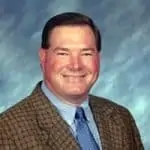
Andrew Zikeli is a senior biogas project specialist with over 8 years of biogas to renewable natural gas project experience and over 25 years of consulting experience in environmental compliance and permitting. He has extensive experience in RNG project development, plant design, permitting and commissioning, and is currently managing pipeline installation for two Wisconsin RNG projects.
Biogas, CNG, and RNG case studies , information and resources here
Solar Ready CCR Site Closures Help Energy Companies Move Toward a Sustainable Future
Electricity is the one big energy source that can be free of carbon emissions. You can make it from the sun. You can make it from the wind. Tap the heat of the Earth, hydropower. While all utilities are moving in a sustainable, environmentally friendly direction, Aliant Energy stands out for making progress and keeping rates reasonable for consumers.
At the recent USWAG Workshop on Decommissioning, Repurposing & Expansion of Utility Assets held October 2019, Eric Nelson presented on the opportunities for solar generation at closed CCR sites and provided an overview of civil and geotechnical considerations when redeveloping closed sites as solar generating assets. His presentation demonstrated these considerations through the use of a case study.
SCS Engineers has assisted Alliant Energy with the design and/or construction of multiple coal combustion residual (CCR) surface impoundment closures. Two of the completed closures are the former Rock River Generating Station in Beloit, Wisconsin, and the M.L. Kapp Generating Station in Clinton, Iowa.
Both sites were closed by incorporating Alliant Energy’s vision to create “solar ready” sites. The Rock River site is now home to just over 2 megawatts (MW) of solar photovoltaic (PV) generating capacity, which was developed on the footprint of the now-closed on-site landfill and ash ponds. Although no solar assets have been developed at the site, the M.L. Kapp ash pond closure represents another opportunity for Alliant Energy to repurpose a closed ash pond for clean power.
Two additional closure designs are in process that incorporates similar elements, making them available for future solar generating asset development.
For more information visit SCS Engineers

Landfill gas (LFG) fired leachate evaporation is a novel technology attracting the attention of landfill owners because it can offer an operational win-win. The technology uses a readily available resource at landfills, LFG, to remove liquid from landfill leachate via evaporation, thus abating this environmental liability onsite, often at a lower cost than conventional leachate treatment options. In addition, combusting LFG to evaporate leachate converts methane, a highly potent greenhouse gas, to carbon dioxide, which reduces overall greenhouse gas emissions.
Landfill owners seeking to implement LFG-fired leachate evaporation must undergo the necessary air permitting and follow applicable emissions regulations. In this regard, air permitting and regulatory requirements for the combustion-related component of LFG-fired evaporation are similar to those applicable to conventional LFG flares. However, in addition, there are permitting considerations for evaporation-related emissions too. As this is uncharted territory for regulators, it is important to work closely with your agency to ensure you or your consultant is properly addressing these technology-specific requirements.
Read Landfill Leachate, Just ‘Evaporate’ the Problem …or Permitting Issues for Using Landfill Gas to Reduce Leachate Volume by David Greene, PE, SCS Engineers. Published by em, the Magazine for Environmental Managers, A&WMA, issue June 2019.
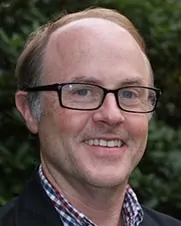
About the Author: David Greene is a project manager at SCS Engineers with a multiplicity of solid waste related environmental engineering experience, including air permitting, landfill gas, financial analysis, due diligence efforts, regulatory development and analysis, compliance planning, greenhouse gas monitoring, emission inventory including emission factor development, SPCC and SWPPP development. Mr. Greene also consults internationally in Southeast Asia focusing on the areas of planning and implementing training and evaluating the feasibility of LFG energy and renewable energy projects at solid waste disposal sites. He is a Professional Engineer in North and South Carolina.
These kids are among the more than 1,200 students and their families who took the pledge to recycle right at the 10th Annual Earth Day Event celebration hosted by Waste Management at Monarch Hill Renewable Energy Park. SCS Engineers professionals contributed their support and know-how to celebrate and educate at the environmental event.
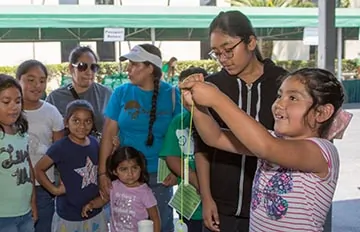
For the past decade, the event has offered students hands-on recycling, renewable energy and environmental-related activities. One of the most popular activities at the anniversary celebration was a wind machine in which students hilariously tried to catch swirling “hurricane debris.” The most recent storm, Hurricane Irma, added 660,000 tons of debris into the landfill in just four months. Experts explained other inner workings of the Renewable Energy Park such as how landfill gas becomes electricity and “clean” renewable energy.
The day’s activities included stations where students target what can’t be recycled in a bow and suction cup arrow game; don WM vests and hardhats beside the CNG truck which reduces greenhouse gas emissions, make a landfill out of candy before taking a bus tour of the real landfill and use recycled materials to make art with Young at Art and musical instruments with the South Florida Junior Chamber Ensemble.
Proving that being good to the environment is a winning strategy, Miami Dolphins’ former wide receiver O.J. McDuffie and former cornerback Patrick Surtain were on hand to sign autographs and take photos, many of which were shared on social media at #greenbroward, a local initiative in Broward County by Waste Management designed to engage and educate the community on sustainability efforts.
As part of the Earth Day festivities, Waste Management also awarded funds to all participating schools. The Dumpster Art Contest featured the handiwork of 14 schools that all took home gift cards to Michaels for future art projects.
SCS Energy announced today the expansion of their renewable energy programs with the support of new team member Todd Stewart, PE, PMP. SCS has one of the longest and successful biogas and renewable energy practices in the United States. Stewart will support the expanding renewable energy programs for the waste industry, working out of the firm’s Pleasanton, California office.
Stewart, a Senior Project Manager, brings more than 30 years of experience managing complex solar and biogas renewable energy, anaerobic digestion, gas pipeline, and compressor station projects executed efficiently and cost-effectively for his clients and their stakeholders. His technical background in waste to energy, advanced composting systems, solar and conventional power generation, gas transmission and storage, and plant operations brings valuable skills to SCS’s clients planning to invest in the use of renewable energy to control the cost of operations and meet environmental compliance and responsibilities.
Stewart’s background spans design engineering, construction management, operations and maintenance engineering, and identifying and resolving environmental issues, and he is experienced with regulatory processes specifically CEQA and NEPA. He has demonstrated expertise in conceptual project development, FEED process, and the technical and fiscal management of large infrastructure.
“Todd has developed and coordinated some of the largest combined solar and alternative power generation projects in the world,” stated Steve Hamilton, senior vice president of SCS Energy. “We’re fortunate to be putting his acumen to work for our clients.”
Stewart is a licensed Professional Engineer in California and a Certified Project Management Professional. He is the past President of the California Society of Professional Engineers and a member of the National Society of Professional Engineers and the Project Management Institute. He earned his Bachelors of Science in Mechanical Engineering from the South Dakota School of Mines & Technology.
The Association for the Advancement of Sustainability in Higher Education (AASHE) has awarded UNH the STARS Platinum rating in recognition of its sustainability achievements. STARS, the Sustainability Tracking, Assessment & Rating System, measures and encourages sustainability in all aspects of higher education. The Platinum STAR is the highest possible rating and held by only a handful of higher education institutions in the world.
Some highlights of UNH’s sustainability achievements:
“UNH committed to use renewable energy and move toward a sustainable energy economy early,” said Steve Hamilton, Sr. Vice President of SCS Engineers – Energy Division. “The decision to convert landfill gases to renewable energy kick-started a very successful program which is paying off for the University and in the surrounding community.”
Benefits include: